Once more we venture into the 1970s, this time to celebrate women who debuted between 1970 and 1979 and whose surnames begin with the letter L.
The five previous instalments of the series cover women writers with last names beginning with A through F, those beginning with G, those beginning with H, those beginning with I & J, and those beginning with K.
J.A. Lawrence
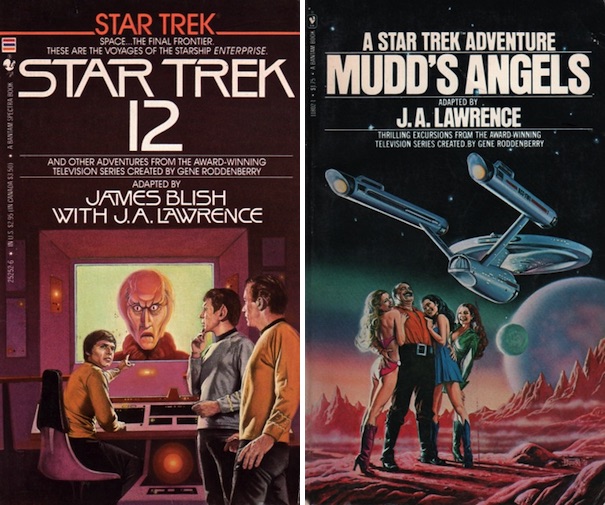
J.A. Lawrence may be best known as an illustrator, but she is also an author. She is perhaps best known for “Getting Along” (featured in 1972’s Again, Dangerous Visions) as well as for the collection Star Trek 12, which was part of a long-running series adapted from scripts of the original Star Trek. While many of her works were co-authored with her then-husband, the late James Blish, 1978’s Mudd’s Angels is a solo work by Lawrence.
Louise Lawrence
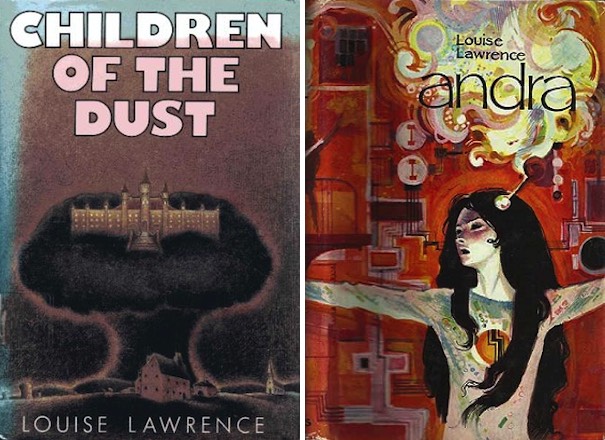
Louise Lawrence’s work was sometimes classified as young adult, presumably because of the fact that her protagonists tended to be young. However, her subject matter was often grim. 1985’s Children of the Dust is a case in point: it’s a multi-generation examination of the effects of nuclear war. It is every bit as jolly as that other British children’s classic, Threads. (Note: Lawrence is the pen name of Elizabeth Holden, but since her works are published entirely under the former name, I’m going with the former.)
Tanith Lee
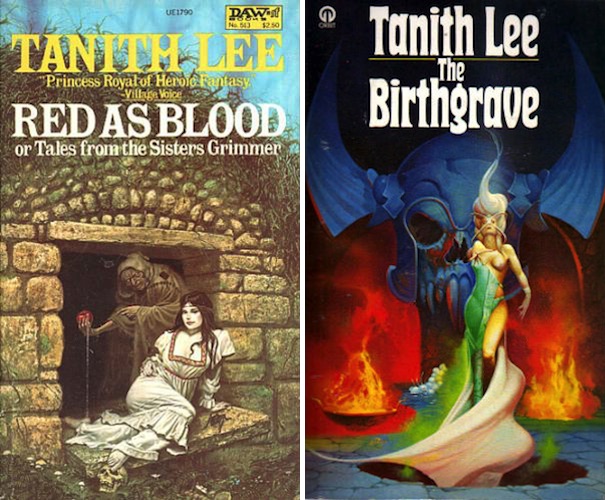
Tanith Lee was incredibly prolific. I’ve reviewed over sixty of her books and haven’t come close to reviewing them all. Over the more than four decades of her career, she ranged across science fiction, fantasy, horror, and other genres. For reasons I do not fully understand, her popularity in North America declined precipitously after 1990 or so. This was perhaps due to a disastrous attempt by her North American publisher to position Lee as a horror author—just in time for a downturn in horror sales (which tend to cycle). Of all the books by Lee I’ve read, I’d recommend her 1983 collection Red As Blood, which takes its title from a 1979 story contained therein. Fans of Neil Gaiman’s 1994 “Snow, Glass, Apples” may find this story of interest.
[Michael Whelan cover, please. The new one makes me sad]
Megan Lindholm
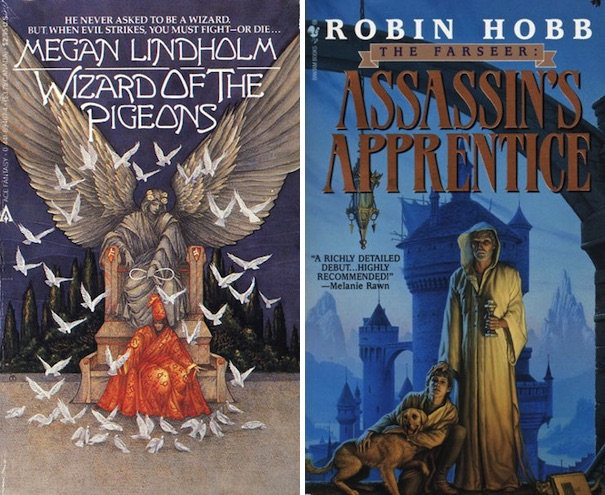
Under which name to cover Megan Lindholm? That’s her real-world name, but she is probably better known to readers by her pen name, Robin Hobb. She has been a professional writer since the 1970s, when Jessica Amanda Salmonson picked Lindholm’s “Bones for Dulath” for the World Fantasy Award-winning DAW collection Amazon! (whose cover is proof that even cover artists of the 1970s were in fact able to give women functional armour, even if they did not often exercise this option). Lindholm, writing as Robin Hobb, is the author of the popular Realm of the Elderlings books. Still, we’re on L and not H, so instead of a Hobb novel I will suggest reading Lindholm’s urban fantasy Wizard of the Pigeons. This book touches on themes such as mental illness and poverty that may make this a non-comfort-read. It is nevertheless a good read.
Jean Lorrah
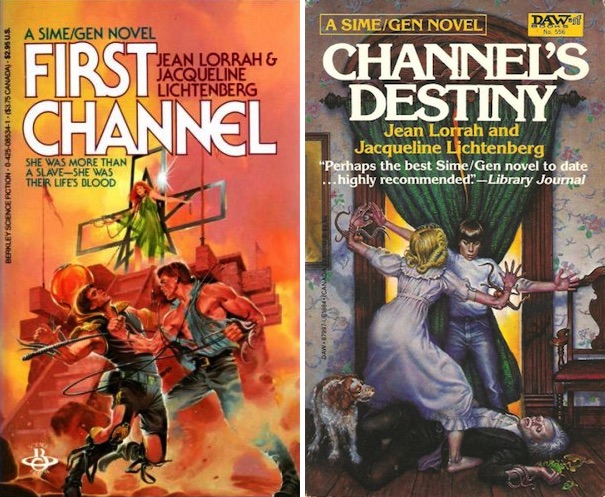
Jean Lorrah, (whose frequent co-author Jacqueline Lichtenberg is disqualified for this series by dint of a late-1960s publication) isn’t an author whose work I know well. I am most familiar with the Lorrah-Lichtenberg long-running Sime-Gen series, in which the needs and desires of the Simes (obligate psychic vampires) and the Gens (food) come into frequent conflict; it’s as though people do not appreciate having their souls consumed by their social superiors¹. The place to begin is always the beginning, which in this case is 1980’s First Channel.
Elizabeth A. Lynn
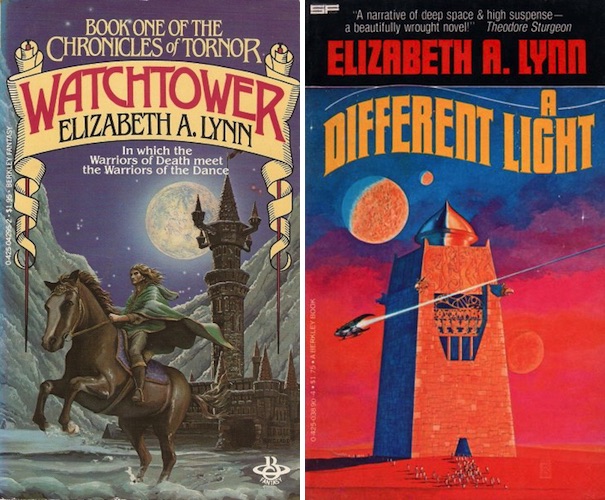
Active since the mid-1970s, Elizabeth A. Lynn’s early stories, often featuring favourably portrayed gay characters (a rarity in those days), earned her a Campbell nomination. In 1980 she won the World Fantasy Award not once but twice, for Watchtower (first volume in the Chronicles of Tornor) and for her short piece, “The Woman Who Loved the Moon.” The now-defunct chain of LGBT bookstores took its name from her novel, A Different Light, which focused on the final days of a man who chose to embrace the lethal side effects of faster-than-light travel rather than a long, dull life lived at home. Her body of work is not as large as some, but, as you can see, it is quite remarkable. I recommend beginning with The Watchtower, in which a man-at-arms and his prince find themselves survivors of a sudden, brutal invasion.
* * *
I read science fiction and fantasy exhaustively back when I was still a teenager, but my reading was not comprehensive. The vagaries of Canadian book distribution meant that I might overlook or never encounter various authors. Thus my list of shame, authors about whom I am currently uninformed:
- Samantha Lee
- Kay Leith
- Betty Levin
- Penelope Lively
- Morgan Llywelyn
- Eileen Lottman
- Alice Low
- Lois Lowry
If you’ve read works by these writers, please share your impressions.
1: I am being a little unfair here, because Simes consume something called selyn, which Gens produce in excess. The process of extracting selyn is only fatal if the Gen feels fear during the feeding process. All the Gen has to do to survive is avoid this emotion…which is unfortunately a frequent side effect of the knowledge that the process to which they are being involuntarily subjected is potentially lethal.
In the words of Wikipedia editor TexasAndroid, prolific book reviewer and perennial Darwin Award nominee James Davis Nicoll is of “questionable notability.” His work has appeared in Publishers Weekly and Romantic Times as well as on his own websites, James Nicoll Reviewsand Young People Read Old SFF (where he is assisted by editor Karen Lofstrom and web person Adrienne L. Travis). He is surprisingly flammable.










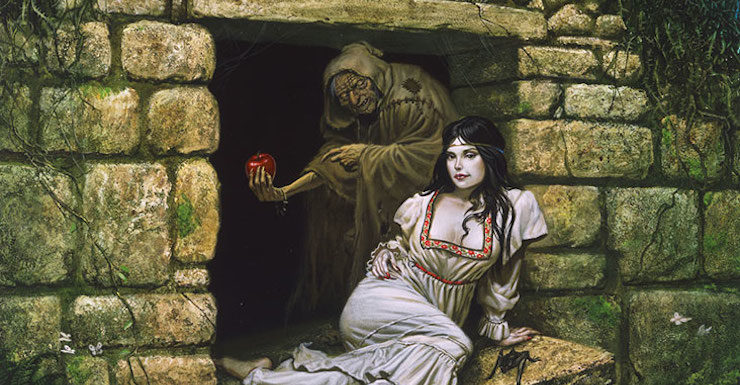
Wizard of the Pigeons is another book that belongs in the “Why the @@@@@$@@@@@#$# Isn’t This In Print?!?!?” article. (Or was it already listed there?)
Lois Lowry wrote the Giver, which is immensely popular, often taught in schools, and made into a 2014 movie starring Jeff Bridges and Meryl Streep (!!!!!).
Love Robin Hobb/Megan Lindholm. Read all of the work under her pen name – one of my favorite authors ever – and quite of bit of the works under the ML name.
A Different Light is my favorite Elizabeth Lynn.
This is such a cool series of articles!
Makes me want to search for each individual author on Amazon and eBay (a second hand book store preferably, but…) and just buy a starter-package to get to know their body of work. Thank a lot for fighting their erasure!
@hoopmanjh re: Wizard of the Pigeons: PREACH IT.
The Giver by Lois Lowry is one of the few books I’d hand to any person in the world looking for something damn good to read.
Broke my heart when Tanith Lee died; her huge production was uneven, but when she was good she was very, VERY good.
I’ve only read Penelope Lively’s first six books (as of the Wikipedia page): all children’s/teen fantasy (as in “this world with magic”) books written in the 1970s, when I was a teen in the 1970s. I loved all of them, though not equally: I think my favourite was and still is The House in Norham Gardens.
I seem to confuse her with Penelope Farmer, though: I could have sworn A Castle of Bone was also by her (but it’s Farmer).
Hm, needs rereading before I can say anything coherent.
My favorites by Tanith Lee are The Silver Metal Lover and Cyrion.
My favorite Tanith Lee, hands down, is the Flat Earth series; but I also love Cyrion and some of the standalone fantasy stuff (Volkhavaar, Lycanthe, Sung in Shadow). Never quite been able to wrap my head around her SF stuff, sadly.
For Irish historical fantasy, no one beats Morgan Llywelyn. “The Lion of Ireland” is one of my very favorite books ever, highly recommend her stuff. Love Megan Lindholm too.
Let it be noted that Tor published a young-adult trilogy by Tanith Lee back in the day: BLACK UNICORN, GOLD UNICORN, and RED UNICORN.
The Lynn novel is Watchtower, no “The.”
Louise Lawrence was one of my favorite authors as a kid, and I adored Moonwind and Calling B for Butterfly. I’ve been afraid to reread them as an adult (and my local library has apparently removed both from their shelves). Both end with ambiguous tragedy, which appealed to younger me.
I read the The Adept books by Katherine Kurtz several years ago, but it took me until just a few months ago to finally track down Lammas Night, which I plan to read as soon as I finish The Lie Tree by Frances Hardinge (another author I discovered via this blog).
Great series!
13: Fixed. Thank you.
Wizard of the Pigeons is so far beyond excellent, I lack words. (However, I became homeless for a year when I was 52. In Seattle. I… don’t think I can ever re-read it again, dammit.)
(I have all of her books, under both names, as well as the … collaborative? collection The Inheritance & Other Stories. Went to her reading/signing at the UW Bookstore when it came out, and (of course) got it signed by both authors.
@9: I read The Silver Metal Lover at exactly the right age. I’m not 100% sure precisely what age that was, mind you, but I was late pre-teen or early teen and, just, WHAM. I’m now pushing 50 and it’s still one of my all-time favorite books, and likely to get pulled off the shelf for a comfort read before even LOTR. (Granted, that’s partly due to relative lengths, but still.)
I haven’t read all of Lee’s stuff by a long shot, but what I’ve read ranged from pretty good to simply amazing, with no disappointments.
When I read A Different Light in the 1980s, I was most impressed by the fact that the main character was a painter. In a world of spaceships, pirates, telepaths, and strange planets, this seemed much more unusual to my teenage self than the fact that everybody was bisexual.
The Sword and Laser podcast/book club is currently reading a Tanith Lee book: Night’s Master, which my library will send me any minute now. I’ve heard of her a lot but I don’t think I’ve ever read one.
I think the only Elizabeth Lynn I ever read (thanks to the public library paperback spinners) was The Sardonyx Net. Someday I should go dig more deeply.
Jean Lorrah wrote some fun Star Trek books, too.
Re: Penelope Lively, I read her non-genre book MOON TIGER and this sentence alone makes the read worth your while:
“Language tethers us to the world; without it we spin like atoms.”
YMMV, of course.
I’m most familiar with Morgan Llywelyn’s Celtic historical…well, let’s call them “re-imaginings”. They fell in a genre of books that I devoured great quantities of back in the day. I suppose the treatment of the mythic elements places them comfortably in the fantasy genre, but somehow I always read them as historicals, though historicals of a semi-legendary version of history.
Re: your footnote on Sime/Gen relations — my recollection is that Gen fear was also a product of a fairly cavalier attitude by Simes regarding the concept of consent. Hypothetically, I suppose a Gen could survive any interaction on the basis of a “relax and capitulate to the inevitable” approach, but given the strong metaphoric parallels to sexual activity in the books, that only makes the whole thing squickier. I recall once summing up later parts of the series as having the drama driven entirely by characters seeking in vain for the psychic equivalent of a good f**k.
The author’s legal name is Margaret Astrid Lindholm Ogden. (I scheduled her kaffeeklatsch for Worldcon 75, so I had to look her up.) “Megan” is apparently just as fictional as “Robin”.
Just to be clear: her own web site gives her real name, it isn’t secret.
@9, Those are my favorite Lee novels also, though she wrote many good ones.
I read the Lindholm Windsinger series, which started very strong but rehashed things in the latter half we’d already been through and “forgot” a lot of characterization that had been gained.
Morgan Llwellyn was really popular in the 80s and 90s for her Celtic fiction, fantasy with a heavy emphasis on history. I don’t see anything published by her in the 70s though on isfdb.
I’ve read most of the books by Morgan Llywelyn and all have been very well written and readable. The ones based in early Irish history are more historical fantasy while ones based in 20th century Irish history (the “19xx” books) are straight historical fiction. They’ve given me a great appreciation for and hopefully a reasonably accurate overview of Irish history. Highly recommended.
Lovely to see Louise Lawrence mentioned (I had no idea that was a pen name). I loved Calling B for Butterfly and Moonwind as a young teen in New Zealand and have retained them in my book collection. I reread Moonwind earlier this year and was delighted that it hadn’t been visited by the suck fairy.
I didn’t know Penelope Lively had written a bunch of children’s books. I’ve read several of her adult novels (TREASURES IN TIME, CLEOPATRA’S SISTER, OLEANDER AND JACARANDA (which is actually a memoir).) She’s very good. CLEOPATRA’S SISTER is arguably sort of SF, as it’s about a fictional country sort of near Libya.
I’ve loved Tanith Lee ever since I read the uproariously funny The Dragon Hoard as a child. I’ve never read a better sendup of the quest narrative, specifically the ‘Jason and the Argonauts’ myth.
It was a revelation to read her more ‘adult’ works. She really knew how to straddle that line between fantasy and eroticism, and was second to none when it came to conjuring outré imagery.
I never managed to find a copy of the dragon horde :(
I have Dragon Hoard but I don’t think I’ve ever actually read it. FWIW, Amazon is showing used paperback copies starting at $1.99.
I recently picked up Tanith Lee’s Flat Earth cycle at a used book store, really looking forward to reading it. I also have the modern printing of Birthgrave and I have agree about missing the older covers.
The Sardonyx Net is definitely my favorite Elizabeth Lynn!
I recommend it wholeheartedly to folks looking for a new read all the time!
I’ve got her Watchtower series but don’t think i’ve ever read them because
i’m missing book 2. Also highly recommend Tanith Lee’s YA Unicorn series.
I was NOT aware that Megan Lindholm and Robin Hobb were the same person!
Learning something new every day :D
Loved Morgan Llewelyn …
but no Katherine Kurtz? Or is she not considered SciFi. Hobb(brill) but no Kurtz?
“Lest the hunter become the hunted.”
Free Alaric Anthony Morgan !!!!
Tanith Lee’s The Silver Metal Lover is, simply put, a classic.
Llywelyn wrote great plays on Irish history, both recreating it and giving it a fantasy edge. I remember enjoying several before I got burnt out on the period.
@wren Katherine Kurtz was in the previous installment that covered authors starting with K! https://www.tor.com/2018/04/23/fighting-erasure-women-sf-writers-of-the-1970s-part-v/#more-354736
What a lot of “L” names in the addendum at the end!
And I agree about the cover for Tanith Lee’s “Red as Blood” – I remember staring at that creepy Snow White while processing a mind-blowing twist in a story, something that happened repeatedly as the anthology went on. The librarian who acquired that volume for my high-school-era branch library may never know how much I loved it, or how much it influenced my life as a female SFF fan.
Lois Lowry’s “The Giver” and sequels are available on Overdrive from my library, so thanks for putting it on my radar! Didn’t Elizabeth A. Lynn also have a series with/about dragons?
Jean Lorrah was a big name in Star Trek fan fiction in her day, mostly about Spock’s parents, Sarek and Amanda. One of them, Night Of The Twin Moons, had some very interesting world building and would have made a good novel in its own right, or at least a novel set on that planet, but I don’t think she’s ever sold one. She did write a couple of novels of her own – Savage Empire and a sequel, I think. I have an email from her somewhere saying she’s self publishing children’s books these days, but I haven’t come across any of them.
#24 – I’ve only read one of Morgan Llywelyn’s books, The Horse Goddess, and I’d agree it’s more historical reimagining than fantasy – for me, it does what Rosemary Sutcliff did with King Arthur: takes a legendary character/event and works out how it might have really happened, if it did. In her case, it’s how the Celts started their relationship with horses, with Epona as the girl who did it, and so ended up as the horse goddess. But no reason not to include it as speculative fiction of a kind. (Actually, I think there are tiny touches of fantasy in it, such as when she sees her sister-in-law’s bright spirit pass on after she has been punishe for having let her wife-fire go out)
I remember my first encounter with Tanith Lee. My bookshop owner waved The Birthgrave under my nose and cried,”Look! Amazing new author, you have to read it!” And she did do some amazing books. Yes, I’ve read that collection of warped fairytales – I’d already read the Snow White one in a magazine. Brilliant! But my favourite of her books was Don’t Bite The Sun/Drinking Sapphire Wine, with The Silver Metal Lover and Sabella close behind.
As always, James, thanks for pointing out the limits of my sfnal reading. And I’m pretty well-read, even by the standards of the old rasfw group. Though I’ve slipped even further behind since then…..
Well, I think of myself as well read but look at all the people I’ve missed.
My favorite novels of Lee’s was Biting the Sun. I still harbor hope that some unpublished part 3 will be found eventually among her papers.
#40 – Jean Lorrah’s Trek fanfic:
Night of the Twin Moons was a full novel fanzine. It went with three collections of Sarek-and-Amanda short fiction (NTM Collected #1 and #2 and Full Moon Rising). It set much of the standard for head-canon of that relationship back in the day.
Jean’s other major Trek fanfic was the two-part Epilogue, which followed Sarek, Amanda, Kirk, and Spock during and in the aftermath of a full-scale war with the Romulans and Klingons. Sarek and Amanda had to cope with the occupation of Vulcan while Spock was reluctantly forced into command of his own ship. It was mostly told in flashback during a stay by Kirk on Vulcan many years later.
NTM fell on the erotic-but-not-p0rn side of things and would never have been publishable as an official tie-in because of the erotic content. But I recall both NTM and Epilogue comparing favorably to the official stuff being published at the time and working as rereads well into my adulthood. They’re still on my shelves, in fact.
Jean’s professional Trek tie-ins (The Vulcan Academy Murders and The IDIC Epidemic) aren’t officially in the same “universe” or completely compatible with either NTM or Epilogue, but the characterizations and feel are very similar.
Man, I miss Tanith Lee! I remember reading ‘Tales From The Flat Earth’ when I was in the 7th grade. My vice Principal came in to talk to the teacher and saw my copy from the SFBC and commented on how good it was. That fostered a relationship that kept me out of any real trouble through out high school. Hope you are well Mr. Beard.
mirth513, you can read Lynn’s “Watchtower” and “The Northern Girl” even without “The Dancers of Arun.” They’re all set in the same world, but the stories don’t intersect.